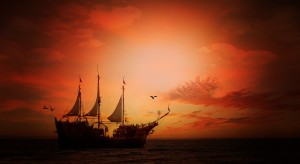In Ship of Theseus, S. is currently on the ship and is describing the passage of time. He expresses the feeling that he has lost sense of time and the only sense he has in the world in the setting sun. He is largely troubled by the fact that something significant has occurred beyond the gunnels of the ship and he would have no idea. Despite this uncertainty and his mysterious purpose on the ship, he does feel relief in knowing that he is heading southward. While he does not know who he is, he does remember that the sun sets in the west and is able to extrapolate that he is heading south because the sunset is on the starboard, or right, side of the ship. His use of “starboard,” also implies that S. has some nautical knowledge.
Theseus, S. is currently on the ship and is describing the passage of time. He expresses the feeling that he has lost sense of time and the only sense he has in the world in the setting sun. He is largely troubled by the fact that something significant has occurred beyond the gunnels of the ship and he would have no idea. Despite this uncertainty and his mysterious purpose on the ship, he does feel relief in knowing that he is heading southward. While he does not know who he is, he does remember that the sun sets in the west and is able to extrapolate that he is heading south because the sunset is on the starboard, or right, side of the ship. His use of “starboard,” also implies that S. has some nautical knowledge.
S. quickly returns to his present goal of escaping the ship by “a burst of reedy, high-pitched trills,” from, what he thinks are, unseen birds. With no other ships to signal or a way to launch a lifeboat, S. decides that his only option is to jump off the boat. This thought gives him an ominous feeling that he may have unsuccessfully tried this before. This relates back to “a vague but terrifying sense-memory of falling from a great height,” one of the three connections S. has from his life mentioned on pg. 6.
High school Eric bracketed the line, “put his faith in the water…has tried that sort of thing before without success” and makes the comment Vaclav/bridge?
It was a suicide attempt – weird to talk about “faith” there.
depends on what he was hoping the water would do.
This may be a close parallel between S. and Vaclav if he were VMS. On page 124, it states Vaclav did attempt suicide by jumping from the Charles Bridge and was never seen again. “Without success” may refer to Vaclav’s survival because it was never confirmed that he died. Above, Eric points out that S.’s faith in the water depends on what he believes is his ultimate goal. If there is a parallel between S. and VMS, it would imply that Vaclav hoped he would not survive the fall.
The comment on trying to unsuccessfully jump is connected to footnote 7, which states, “1900 saw the anonymous publication of a poem called “La Foi en Eau” (or “Faith in Water”). It is possible Straka was making a reference to it, but there is no clear evidence of such.” FXC is upfront about the possibility of this being an inconclusive and irrelevant footnote, which is confirmed by Eric. This implies that the purpose of the footnote has to be part of FXC’s code to VMS.
In response to this, Eric writes This poem does not exist! No wonder VMS didn’t want annotations. This is asinine. At this point, high school Eric did not realize the footnotes were intended as a coded message to VMS. It is true that the poem, “La Foi en Eau” is nonexistent in both the world of S. and in real life. Jen and Eric both comment again on this fact, which also reveals their level of trust in their professional relationship.
I double-checked on the poem. I think you’re right.
I know I’m right. You didn’t have to waste your time.
Hey, you’ve missed a few things. More than a few.
This exchange shows that Jen does not trust Eric’s research abilities and still does not trust him on a personal level. Eric also shows his self-assurance, which Jen decides to put down as arrogance through her mention of his other mistakes. This shows how they still have a fairly antagonistic relationship at this point.


You must be logged in to post a comment.